Welcome To The Jungle; An interview with Jamie Stewart of Xiu Xiu
(Web Editor’s note: This feature was originally published in issue 37 of Ghettoblaster Magazine.) Although it wasn’t glaringly obvious to Xiu Xiu mastermind Jamie Stewart while he was writing it, Angel Guts: Red Classroom, the group’s latest full-length, is really an homage to his new neighbors. Having spent the previous four years living in North Carolina, Stewart relocated to Los Angeles, moving into a neighborhood whose notorious, and well-deserved reputation for danger and violence was unknown to him. The amenities offered by his new home include a park divided among four gangs, a lake routinely dragged for bodies, and a building wherein two infant skeletons were recently uncovered. For the resulting response, Angel Guts: Red Classroom, he and his collaborators put their most radical and darkest foot forward, uncovering unsettling and touchy subject matter along the way. Racialized sex, double suicide, criminality, fear of physical harm, the record is no Mister Rogers tale. The impact of existing in his new environment is felt in each lyric, which bleeds the essence of terrible beauty, despair, violence, humanity, and uncertainty. The record, released by Polyvinyl on February 4, is Xiu Xiu’s first album of original material since 2012’s Always and caps an interesting few years for Stewart who travelled with Michael Gira’s Swans, and released Nina, an album that documents his unique take on a selection of Nina Simone covers. Inspired by a combination of muses, including John Congleton who recorded the LP and offered critical input its approach, Xiu Xiu entered the studio with analog synths, a drum set, and 1970s analog drum machines. The lethal combination of inspiration and tools introduces the groups renewed focus to create risky, and gripping avante garde music that pushes the boundaries of boldness in barely bearable and ominously fantastic ways. This is what Stewart told Ghettoblaster about obsessing, feeling, transforming, and not giving up. What prompted the move to your new home and did the change of scenery set the mood or tone for an of your new record? Yeah, I had been living in North Carolina under not the best of circumstances and had been wanting to move away for a long time. I figured I’d move back to San Francisco or Los Angeles or New York and I flipped a coin and ended up in Los Angeles. A friend of mine found an apartment for me in a neighborhood, which I didn’t know very well. But, as it turned out, it was an incredibly dangerous and somewhat fantastical kind of place. It is such a mess here that it is almost surreal. I didn’t really realize the affect the neighborhood had on the record until my bandmate Angela pointed out that almost every song was about things that had happened to us here, or things that were going on here. Is recognizing that it catalyzed you in an artistic way what has kept you interested in staying there? I just moved here about a year ago, but really economics has kept me here. Are you willing to acknowledge on some level that some of your subject matter and artistic response to is it feels challenging or dangerous to some listeners? It’s not really any of my business how listeners respond to it. People can think whatever they want to think (laughter). I did a search today and realized that there are several Xiu Xiu records at our public library and it occurred to me that there may be some new music listener who stumbles across your records and is challenged in a way that they’ve never been challenged before…Is that a welcome feeling for you as an artist; to challenge people’s normative feelings about who they are and what art they respond to at their core? Well, I wouldn’t presuppose that any of that actually goes on (laughter). It would be nice. It would be nice to think that it would. There are certain types of bands and art that are important to me. If that type of situation did happen for someone, great. I can only be grateful for bands and artists who have done the same for me… Did you first encounter John Congleton when you did the split with The Paperchase, or is your relationship with him older than that? After our first record he wrote me a letter saying that he’d be interested in working with us. We stayed in touch and our bands did a number of shows together over the years. It took us a while before we were able to do a full-length together. The first time he produced something that I was working on was the collaboration I did with Jonathan Meiburg from Shearwater called Blue Water White Death. So I’d actually known him for about seven years before we had a chance to work together. When you started writing the material for the new record he became the natural choice for this? What was it about him and his approach toward his work endeavors that made him right for this? Our approach to this record was really his idea. He mixed our last record and said that the next one should be simple and really stripped down like something the band Suicide would do. And as soon as he said it, it seemed like the right thing to do. Additionally, he likes things to sound evil basically. That’s his natural inclination. For me he’s had a profound impact; he’s able to push sounds in ways that I’ve never even imagined before. The title tracks that bookend the record couldn’t be any more different to the casual listener in terms of space and volume and mood. Which came first, “Angel Guts” or “Red Classroom”? (Laughter) I did them both on the same day (laughter). Do you think people will have that kind of surprised reaction to them? We did our best to make this record be very different than anything we’d done before. I hope that people have a different reaction to it than the records we’ve released in the past. But as I said before, I really don’t have any control over how people react. We tried to do something different because the pop influences, which had been the driving force from the last several records, completely melted away from my brain. It is just not there anymore. So doing another pop record would be completely false. Did I answer that question? I think so. Do you have songs on the record that you’ve become obsessive about or is it the kind of thing where you put something out into the universe and then never really revisit those initial feelings later? Everything that is on that record is very much present in my current consciousness. We didn’t finish the record that long ago. Do you believe that making a record like this affects or changes the core of who you are as a person or is there a distinction between an artist as an artist, and an artist as a person? Personally, making this record affected me tremendously. I don’t think that is inherent in every artistic process. I don’t think that it needs to be. At the risk of sounding like a lunatic, there is not a lot of distance between what you’re hearing here and what the lives of the band members are actually like. So these are things that you feel constantly and struggle with consistently even after you’ve presented them in the recording studio? I would never record something that I didn’t feel. It’s not like upon completing a song that the feelings are expunged from my consciousness. I’m certainly not in the exact emotional state of what’s on the record every second of every day, but it is a regular part of my life and the lives of the people who are in the band. Recording things is as much a way of processing feelings for me, as it is living through them. In 2013 you also did the Nina album. Had that been in the work since your earlier covers EP in 2006, or was it something else that moved that back to the forefront for you? No, they were totally unrelated and I undertook those projects under completely different circumstances. They weren’t related. I read that you had some conversations with Michael Gira that ignited your focus on the project… I’ve d
one a couple tours with Swans and we were talking at length backstage one night about how we both loved Nina Simone. The next night we played a show together and I didn’t feel like I played particularly well, and I was sitting back stage feeling terrible about it. And I was listening to Swans play incredibly well, which only made me feel worse…not that I was jealous, but the fact that they were playing so well only pointed out to me how badly I’d played. So I put on my headphones and was listening to Nina Simone and I was realizing that she had all these dramatic ups and downs, but only got better. It made me want to try to get better, and not to want to quit. So the combination of that conversation and experience provided the inspiration for the record. What has the experience of being in the trenches with Gira done to affect your approach to your output? It has raised my standards tremendously (laughter). You’ve been doing this for a long time and have considerable chops too…what is it about his approach that challenges you in that way? I think it is what challenges anybody. He is incredibly devoted, incredibly relentless, super talented. He’s able to create something that no other band has done before. Essentially, everything I’ve ever wanted to do, he is currently doing. Last time I talked to you was for a feature for Ghettoblaster online, and the next day I spoke with Youth Code, who relayed a story about eating next to you at a Vietnamese restaurant and how they got a kick out of dining in the same restaurant as the man who’d released a music video with a woman puking on him… (laughter) That said, you also mentioned really liking them too. Could we ever anticipate you doing a collaboration with them? I hope so. We are touring together this next year. I’m hoping that discussion comes up. I’d really like to do that. They’ll be on the February/March tour. (Timothy Anderl)



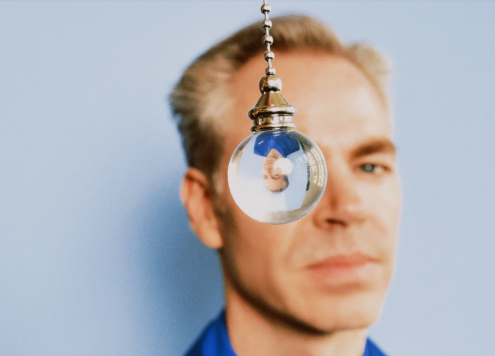

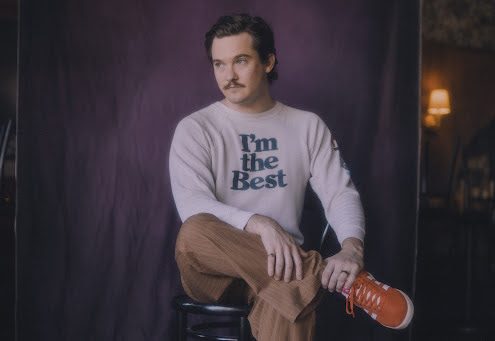
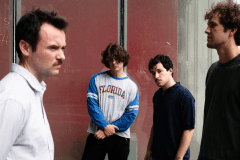
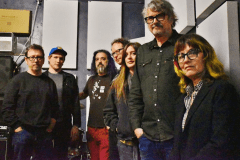

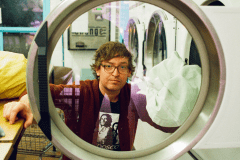

Social Media